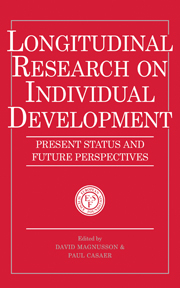Book contents
- Frontmatter
- Contents
- List of principal contributors
- Foreword
- Preface
- 1 Human ontogeny: a longitudinal perspective
- 2 Genes, experience and development
- 3 The human brain and longitudinal research in human development
- 4 Longitudinal research and a biology of human brain development and behaviour
- 5 Cognitive, social and emotional development
- 6 Developmental psychopathology: some historical and current perspectives
- 7 Developmental psychopathology as a research perspective
- 8 Longitudinal research on human aging: the power of combining real-time, microgenetic and simulation approaches
- 9 Development, aging and control: empirical and theoretical issues
- 10 Some methodological issues in longitudinal research: looking ahead
- Index
1 - Human ontogeny: a longitudinal perspective
Published online by Cambridge University Press: 22 March 2010
- Frontmatter
- Contents
- List of principal contributors
- Foreword
- Preface
- 1 Human ontogeny: a longitudinal perspective
- 2 Genes, experience and development
- 3 The human brain and longitudinal research in human development
- 4 Longitudinal research and a biology of human brain development and behaviour
- 5 Cognitive, social and emotional development
- 6 Developmental psychopathology: some historical and current perspectives
- 7 Developmental psychopathology as a research perspective
- 8 Longitudinal research on human aging: the power of combining real-time, microgenetic and simulation approaches
- 9 Development, aging and control: empirical and theoretical issues
- 10 Some methodological issues in longitudinal research: looking ahead
- Index
Summary
INTRODUCTION
Development, in its most general form, refers to any process of progressive change. In biology, development refers to progressive changes in size, shape, and/or function during the life-span of an organism. Research on human ontogeny covers this process from conception to death. Two concepts are central to this definition. The first one is the concept of change, in size, shape and/or function. The second one is the concept of time. The definition implies that development is not synonymous with time. Time is not equivalent to development, but development always has a time dimension. Consequently, processes that go on without change, within existing structures, do not constitute development. Thus, developmental models must be distinguished from models that are restricted to current perspectives which analyse and explain why individuals function as they do in terms of their current psychological and biological dispositions.
Individual development has long been an important area of research in biology, education, medicine, psychology, sociology, and related disciplines. There are several reasons for this interest.
Knowledge about the development process; which factors operate, and how, is of scientific interest in itself. Such knowledge contributes to our understanding of individual functioning in a variety of respects that change over time and that can be seen developmentally throughout the whole life-cycle. How elderly persons function is not only determined by the fact of being old in age, but is an outcome of their life-history. Understanding the aetiology and moderating factors of senile dementia requires a process orientation, and understanding the conditions of ‘life quality’ at old age requires knowledge about life precursors of ‘successful aging’ (Bakes & Bakes, 1990).
- Type
- Chapter
- Information
- Longitudinal Research on Individual DevelopmentPresent Status and Future Perspectives, pp. 1 - 25Publisher: Cambridge University PressPrint publication year: 1993
- 3
- Cited by



